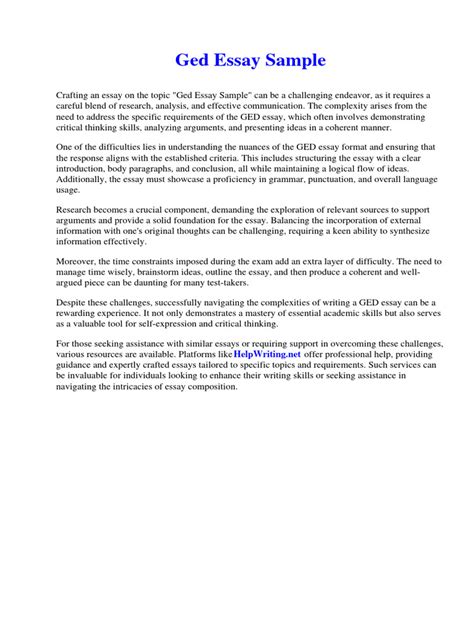The GED test is a high school equivalency exam that is accepted by most colleges and universities in the United States. The test consists of four parts: reasoning through language arts, mathematical reasoning, science, and social studies. The reasoning through language arts part of the test includes an essay question. The essay question is worth 50% of the total score for the reasoning through language arts part of the test.

The essay question on the GED test is a persuasive essay. The question will ask you to take a position on a particular issue and to support your position with evidence and reasoning. The essay should be well-organized and well-written. It should be free of grammatical errors and should use clear and concise language.
Here are some examples of essay questions that you might see on the GED test:
- Should the drinking age be lowered to 18?
- Is social media good or bad for society?
- What is the most important issue facing our country today?
Here are some tips for writing a persuasive essay for the GED test:
- Choose a topic that you are passionate about. This will make it easier to write a convincing essay.
- Do your research. Make sure that you have a good understanding of the issue that you are writing about.
- Organize your essay carefully. The introduction should state your position on the issue and provide a brief overview of your argument. The body paragraphs should develop your argument by providing evidence and reasoning. The conclusion should restate your position and summarize your argument.
- Use clear and concise language. The essay should be easy to read and understand.
- Proofread your essay carefully. Make sure that there are no grammatical errors and that the essay is well-organized.
Here is an example of a persuasive essay that you might write for the GED test:
Prompt: Should the drinking age be lowered to 18?
Essay:
The drinking age in the United States is currently 21. This law was passed in 1984 in an effort to reduce drunk driving and underage drinking. However, there is a growing movement to lower the drinking age to 18. Proponents of this change argue that it would reduce underage drinking, decrease drunk driving, and give young adults more freedom and responsibility.
There is some evidence to support the claim that lowering the drinking age would reduce underage drinking. A study by the National Highway Traffic Safety Administration (NHTSA) found that the number of underage drunk driving deaths declined by 13% in states that lowered the drinking age to 18. However, it is important to note that this study was conducted in the 1980s, and it is not clear whether the same results would be found today.
Lowering the drinking age could also lead to a decrease in drunk driving. According to the NHTSA, underage drivers are more likely to be involved in fatal car crashes than adult drivers. This is because underage drivers are less experienced and are more likely to take risks. By lowering the drinking age, we could reduce the number of underage drivers who are drinking and driving.
In addition to reducing underage drinking and drunk driving, lowering the drinking age would also give young adults more freedom and responsibility. At the age of 18, young adults are considered to be adults in the eyes of the law. They are allowed to vote, serve on juries, and join the military. However, they are not allowed to drink alcohol. This sends a mixed message to young adults and can lead to confusion and resentment. By lowering the drinking age, we would be giving young adults more freedom and responsibility.
Of course, there are also some arguments against lowering the drinking age. Some people believe that it would lead to an increase in underage drinking and drunk driving. Others worry that it would send the wrong message to young people. However, the evidence suggests that lowering the drinking age would actually have a number of benefits. It would reduce underage drinking, decrease drunk driving, and give young adults more freedom and responsibility.
In conclusion, there are a number of good reasons to lower the drinking age to 18. It would reduce underage drinking, decrease drunk driving, and give young adults more freedom and responsibility. The evidence suggests that the benefits of lowering the drinking age outweigh the risks.
